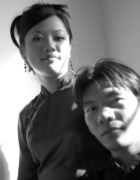Voices: Love in the Time of HIV/AIDS

Frika Chia Iskander and Samuel Nugraha.
(Photo: Ucok) |
October 2006—Frika Chia Iskander and Samuel Nugraha are HIV/AIDS advocates based in Jakarta, Indonesia—Frika is an advisor to APN+ (Asia Pacific Network of People Living With HIV/AIDS), Sam works with the UNAIDS Secretariat, and both are members of TREAT Asia’s Asian Community for AIDS Treatment and Advocacy (ACATA). Sero-discordant since before they met (Frika is HIV-positive; Sam is negative), the two were married in 2005. In this column, they discuss the challenges and satisfactions of their relationship and their shared commitment to the fight against HIV/AIDS.
Sam—Frika and I met in 2000, and a year later we first started to develop a relationship. Basically we had no idea what to do. It was quite new and weird for both of us. Our feelings for each other were getting stronger but it was strange because of Frika’s HIV status and the ways people would regard us as a sero-discordant couple. I was conflicted inside, but the feelings kept growing and I knew I wanted to have this relationship.
A relationship like ours is a real challenge. When it first developed some people had a lot questions—Are you crazy? Are you looking for some sensation? Do you want to get infected? But it didn't concern me because I didn’t need any approval. We didn’t disclose our status to everyone, but the news spread among people in HIV/AIDS organizations—“Oh, the sero-discordant couple!” They treated us a little like freaks. We want people to have a more honest picture of what our marriage means and what it’s really like to make a relationship work between positive and negative partners.
Frika—At first, Sam had a lot of problems dealing with me. I wondered why he wanted to have a relationship with me—was it because he pitied me?—so I kept testing him, making him prove himself. I didn’t recognize that I was giving him such a hard time! But then I realized that his feelings were deep and I saw that I had been pushing him away. So we began to try to find ways to make our relationship work.
Some friends in my HIV support group saw Sam as an outsider, and through that I began to see how HIV-positive and -negative communities become isolated and exclusive. I started to advocate within my own group that we avoid pushing negative people away. After around one year, Sam moved into the HIV field—he had been working with drug users and I had been working with positive people. That’s how we both ended up fighting HIV/AIDS.
Sam—Through Frika, I have learned how to speak with positive people, despite all the barriers. I am better at pushing the barriers away. Often positive people will say, You don't know what I feel. It's like a stop sign: Don’t come near. I thought about that and I realized that nobody really understands anyone else, whether they’re positive or not. So I started to think that these barriers are artificial and I began to explore much more deeply what the differences between us are. I tried to understand through Frika what the impact of HIV is for her and for us as a couple.
Frika—It's quite interesting. Through our relationship I started to understand how affected communities feel also—families and friends of people with HIV/AIDS. I learned a lot from Sam. Often when we discuss something we have both perspectives.
Sam—When we told my parents about Frika’s status there was a big fight. They showed me scary videos of couples with sarcoma and little kids and all that. But I let them, and when they finished I said, Let me show you mine, and I gave them educational materials to help them understand. Finally, I said, I’m not asking for your approval. If you’re going to support me, I would be grateful, but if you don’t, it won’t stop me. It took one year after that before they had a good relationship with Frika. But now when we go to my hometown, my parents pick her up and then go shopping and all that.
Frika—At first when I was introduced to his parents, they liked me as Frika, as a person. They didn't know my status at first. Once they knew, they started to question him—Are you sure? Do you want to go through this with an HIV-positive person? But because I had already built the relationship before they knew my status, it was easier. We had also stopped using drugs and we were living much more responsible lives. Our relationship was quite strong by that time.
Sam—We’re not a perfect couple. We have problems, of course—we don’t want people to misunderstand and think that this is the perfect relationship. It’s not like that. The point is that humans are not really so different because of something like HIV status. Humans are humans. The challenges never stop but we’ve been fighting for this relationship. We do whatever we do to support our lives so we can enjoy them.